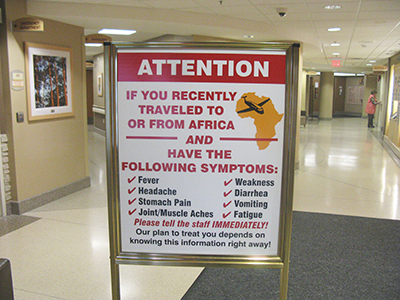 This sign is located at the main entrance of the hospital.
This sign is located at the main entrance of the hospital.
Oneida Healthcare Center
(Oneida, NY – Oct. 2014) Oneida Healthcare has released information regarding precautionary steps it’s taking to be prepared for any patients who might arrive at the hospital with Ebola symptoms.
“Basically, we’re following the Centers for Disease Control and Prevention Checklist for Ebola Preparedness,” said Mary Parry, vice president of operations, who oversees the hospital’s emergency preparedness plans.
She explained that the checklist includes:
* Putting procedures into place to rapidly screen arriving patients for symptoms and risk factors for Ebola. Patients meeting these criteria should be immediately isolated and tested for Ebola. That also includes making sure the hospital conducts periodic spot checks and inspections to determine whether triage staff and other front-line staff are incorporating Ebola screening procedures and are able to initiate notification, isolation and personal protective equipment procedures.
* Using CDC-recommended infection control practices that have proven to be effective against communicable disease. This means assuring the consistent and correct use of PPE, frequent hand washing and proper decontamination of surfaces and equipment in order to eliminate the transmission of Ebola and other communicable diseases. The CDC guidelines also recommend that hospitals review, implement and conduct drills with all first-contact personnel, clinical providers, ancillary staff and any other staff as appropriate.
“We have already conducted an internal drill and used that to further our readiness,” Parry said.
She said the goal is to make sure all of the hospital’s healthcare workers know what to do when encountering a suspected Ebola patient, and it’s critical to know who to notify and to make that notification immediately.
Ebola is a nationally notifiable disease and must be reported to local, state and federal public health authorities. The hospital is also in contact with local and state health departments to confirm communication strategies and plans for working together should the hospital receive a suspected Ebola patient.
“While there is, as yet, no proven treatment available for Ebola, symptoms are treated as they appear and basic interventions, when used early, can significantly improve the chances of survival,” Parry said.

